All the Reasons for Haunters to Get Involved With Their Local Community or Professional Theater
Welcome to this blog, which is based on Episode 17 of my A Scott in the Dark podcast. That one, like quite a few of my podcasts, was related to what was going on in my life at the time I recorded it. At that particular time, I was in the midst of doing a play called Blithe Spirit, which was written by Noël Coward in 1941. I suspect you die-hard haunters are starting to yawn, but stay with me here.
This is first time in 14 years that I’ve done scripted live theater, other than immersive stuff, as an actor. Yes, I’m that old. There’s a great phrase that I live by, which is, “You should do something that frightens you every single day.” I’ve kind of expanded that to, “You should do something that frightens you—and something that frightens somebody else—every single day.” Going back to the stage as an actor in a theatrical piece terrified me, but I’m so glad I did it.
I played a character named Charles Condomine, an author who invites a psychic medium to his house to do a little research for an upcoming he’s writing and accidentally calls back the spirit of his deceased first wife. It’s a little spooky, it’s a little funny, it’s a little romantic, and it was just a lot of fun.
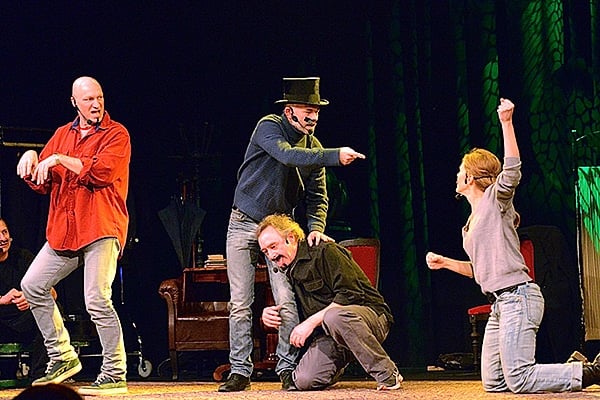
Haunt and Theater Are One and the Same Thing
Since I did a theatrical piece, I thought it might be interesting to do a podcast about how theater and haunt can work together in ways you may not have thought of before. These might not necessarily work for everybody, but certainly they’re worth thinking about. For those of you who’ve listened to my podcasts, read my blogs, met me, or seen any of my presentations at various and sundry shows, you know I believe haunt and theater are one in the same thing. Haunted attractions are a theater piece that you walk through. I’ve always believed that, and I’ll continue to believe that. This doesn’t mean you, as a haunter, have to be remarkably well versed in theater, but it’s important to understand the basics.
Almost every community has some sort of local theater scene going on. I’ve done a lot of stuff with an organization in Tampa called Theater Tampa Bay. I’ve done everything from judging productions to sitting on the board. If you’re not involved in your local theater, you might want to branch out a little bit and poke around.
What I’m going to talk about in this blog is why and how theater can benefit you as a haunter. You have to begin by accepting that haunt is theater. You may think you’re a haunter, not a theater person, but they’re so interrelated. Haunters can learn a lot from the theater community, and the theater community can benefit from the experience haunters bring as well. So, it’s a win-win scenario when you get involved with your local theater company.
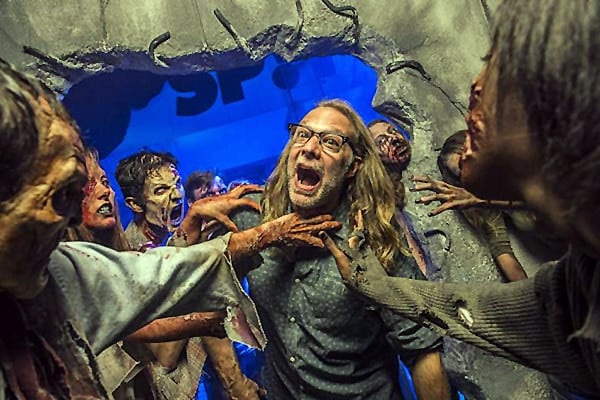
Getting Involved with Your Local Theater is a Way to Make Great Connections
The first benefit that comes to mind when you start involving yourself with your local theater community is you make some great connections. You meet some great people that can benefit you as a haunter—lighting designers, audio designers, and so forth. These people may have a freak flag they want to fly every now and then, and what better way to do that than designing lights or sound for a haunted attraction? They can bring a whole different perspective and a whole different emotional language to your haunt. The best way to get to know these people is to work with them, so get out there and volunteer at your local community theater or find a professional theater that needs some extra help—and almost every theater needs help.
You may feel you have absolutely no experience, but, as a haunter, you have experience with everything from hanging lights to hiding cords to recording music and sound effects to installing speakers to building sets to distressing things to doing costumes to doing makeup. You’ve definitely got some experience and, if you find the right theater company, you’ll be able to edge your way in and start making those connections.
Need Actors? Check Out Your Local Theater
Not only do theater companies provide a great opportunity to meet designers, they’re great places to recruit actors. I’m aware there’s an ongoing debate about this. I’ve heard haunters say, “I don’t hire actors, because they don’t know how to haunt.” My feeling is you’ve hired the wrong actors, because good actors—trained actors—can adapt to the situation of a haunt. I’ve done it, and I know it works. The trick is to get people who don’t think they’re actors but are actory, if you know what I mean. If you get people who are really good actors and can create wonderful characters, that can bring a whole new life to your queue lines and to your key moments in the storytelling process. Plus, they may be able to connect you with folks who may not be trained stage actors, but they might be absolutely perfect for your haunt. So, again, your local theater is a great way to connect with actors and even staff.
If you’re a haunt actor, I strongly recommend you go and audition for some form of theater if you haven’t already. Even if it’s a community theater and a volunteer situation, you’ll learn so much about how to affect people emotionally, how to make it fresh each night, how to reinvent the same thing over and over and over and over so every single guest that experiences it experiences it like it’s the first time you’ve ever done it. It gives your acting chops offseason polish when you’re doing that.
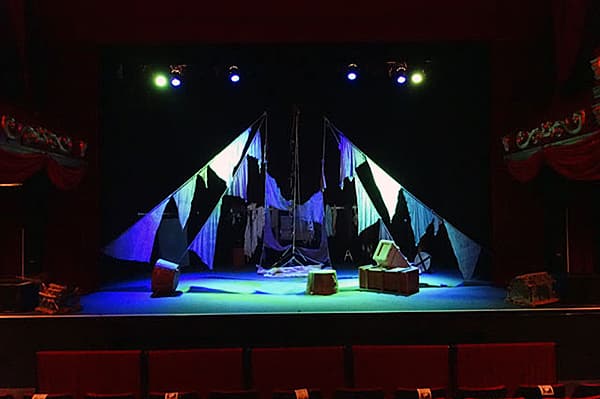
To Learn About Actors, Audition for a Role
If you’re interested in being an actor in a piece of live theater, audition for a role. Whether you get the job or not, it will give you a better understanding of the vibe at auditions. If you happen to be a casting director at a haunt, for example, audition for a role. This is a great way to get a feeling for how nervous those actors are, and you’ll also understand the importance of finding the right people for the right role.
With Blithe Spirit, the director, who’s a friend of mine, called me and said, “Would you be willing to come in and audition for the show?” I was like, “Sure, I’ll come in and audition for the show. Why not? I haven’t auditioned in a long time, but let’s do something that puts me out of my comfort zone.” I was lucky, because I didn’t have to prepare anything. It was just reading from the script. So, I read over the scenes a couple of times and thought, “This will be fun.” So, I went in and read with an actress who’d already been cast. I went home thinking, “That was fun. I’m glad I did that.”
Later that night, I got a call from the artistic director of the theater company, another person I’ve known for a very long time, and she said, “We were trying to find somebody really handsome for this role, but we couldn’t find anybody, so would you like to do it?” I said sure. That was a great wake-up call for me about how the audition process goes, and how people feel before, during, and after an audition. This will help me the next time I’m casting, whether it’s for a haunted attraction, an immersive theater piece, or whatever. Going through a theater audition may give you some new ideas on how to find people who can do exactly what you need them to do for your haunt.
Connecting with Marketing Folks
Other good connections you might make in doing local theater—whether it’s professional or community—is with their marketing folks. Find out how they market their plays. Do they use social media? Do they contact local news folk? Do they try to get on the radio? You might find something you hadn’t thought about. Theater companies are running on the same shoestring budgets as haunted attractions. Most of them are nonprofit organizations, whether they’re professional or not, and they get grant money, but they’re still trying to make every dollar spend like $10, $20, or $30. So, hang out with their marketing folks, find out what connections they have. I’ll talk about this later in greater detail, but find a way to share your databases (yours and theirs), because there’s an overlap among haunt fans and theater fans. You might be able to really expand both your databases.
Don’t be afraid to volunteer. Everybody thinks, “I can’t give anything away,” but, the truth is, you’re not giving anything away. You’re investing in your product by helping somebody else out, so, come haunt season, they might say, “Here’s our list of who we contact when we open a new show.” If you’re really lucky, somebody will say, “Here’s our donor list,” or, “Here’s our board list.” These are people who are already interested in supporting some sort of performance, and they just might, around Halloween time, want to help out something spooky. So that’s another reason to get into the theater and make those connections.
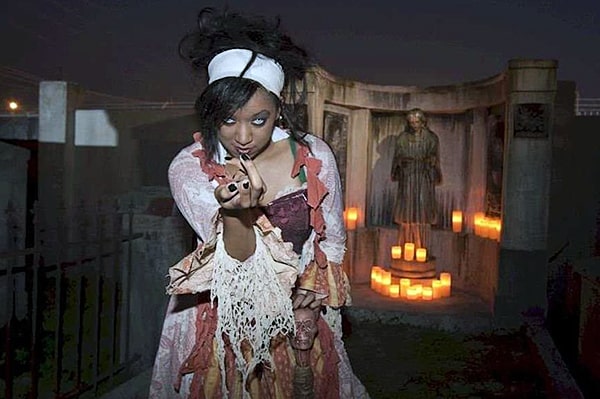
Become a Scenic Painter or Special Effects Person for Theater
Of equal importance to the connections you might make is the experience. If you’re a haunter who’s fascinated with building sets, the more sets you get to build and the more scenic painting you do, the better you get at it. The way a lot of theater companies work is they have a set designer who designs the set and is usually the lead construction guy or gal as well. They’re always looking for scenic painters—people who can come in and make the walls they’ve built look like rich oak paneling or metal or wallpaper or anything but what the walls are actually made of.
Does all of this sound familiar? If you’ve ever done a haunted attraction, chances are good you’ve done some form of scenic painting and had to make a plain plywood wall look like it belonged a gothic manor or inside a factory or the interior of a spaceship. Building scenic for haunted attractions is no different than building scenic for theaters. Professional theaters and even community theaters will sometimes pay people to do this, so, it can be a way to earn a little extra money while gaining additional experience for your haunt.
The other thing that theaters are always looking for—depending on the production, of course—are people who can do some type of special effects. In Blithe Spirit, for example, there was a point where the spirits—who, up to this point, nobody had seen, including the audience—tear the set apart. This required some special effects. The scenic designer had it well under control, but I made a couple of cool suggestions and we were able to make them happen—paintings flew off the wall, the piano slammed shut, books flew off the shelves.
Again, does this sound familiar? Theaters are looking for people with this expertise. Even if you haven’t done specifically what they need, I’m sure you could help. I’m sure you could make suggestions about situations in which they could use monofilament or a spring trap or pneumatics or anything and everything we use in haunts all the time. Obviously, not every piece of theater requires this, that but there are shows like Dracula, Rocky Horror Picture Show, the musical Jekyll and Hyde, and Blithe Spirit that have different needs for special effects.
If you’re a makeup artist or a costume designer in a haunt, you can use those skills in live theater, so why not get paid for them? Why not put together a portfolio of costumes that don’t have blood on them, things that aren’t covered in Great Stuff, and some of your 18th-century Edwardian Steam Punk Goth material? Get the blood off, take the watch gears off, and now you’ve got costumes for The Importance of Being Earnest, if you so desire. That’s another great opportunity to get paid while you’re refining and adding to your skills.
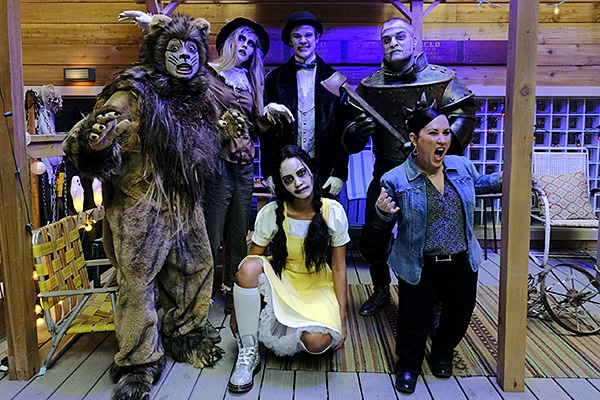
Keeping Your Haunt in the Public Eye All Year Round
The other thing that working with your local theater does—whether you’re an actor, a designer, or whatever you do for your haunt—is give you something put up on your haunt’s website: “Come see John and Marsha So-and-So in Such-and-Such play, and then come see us in October.” It’s a way to remain in touch with your haunt audience, because you’re constantly giving them other things to do. It gives you an opportunity to build a following online—“Go see Bill So-and-So’s lighting at the Such-and-Such community theater.” It keeps you viable, it makes you visible within the community, and it builds your credibility. When your haunt comes around, somebody might think, “Oh yeah, I saw those actors in the Odd Couple. They were hysterical. I wonder if they can be scary.” Well, yes, they can!
Working in your community theater keeps your haunt, your haunt actors, and your haunt designers in the public eye, even in the offseason. Also, if you’re a haunt actor, it gives you the opportunity to perhaps be seen by haunt owners. Invite them to come and see your show, so when the haunt season rolls around, you’re on the top of their list. Or maybe they write something specifically for you. I’ve done this many, many times. The haunt owner or director will know, when going into casting, that they want to see a particular actor at the audition, because they’ve written a piece with them in mind. You’ve heard me talk about one of my dearest friends, the great haunt actress Luna Mystique AKA Diana Bennett. I’ve written roles specifically for her many times, because I know what she can do, and it makes my job as a casting director so much easier.
If you’re an actor and you haven’t built up much of a rapport with haunt owners, or you’re in a new town or environment, get involved with the local theater, even if your end goal is to work as a haunter. You can invite the haunt owners to come and see you in whatever production. They may or may not come, but they know you’re an actor, and they know that you’re interested. If you’re a smart haunt owner, you’ll go to some of your local theater productions—even high school and college theater productions—to see who’s out there as far as talent goes. Sometimes, actors don’t even think about haunted attractions as an option. Some of them don’t want to do it, and that’s fine. If they don’t want to do it, you don’t want them. But others may not even realize it’s an option, and they’d realize, “I’d be able to act, and I might get some money for it!” If you’re a volunteer haunt, these actors may want to do what they love to do just for some sort of recognition or a coupon to McDonald’s. Even if, as a haunt owner, you can’t pay, you can incentivize it.
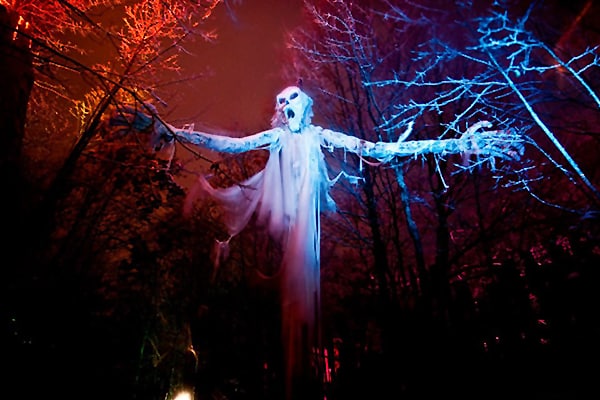
Learning from Theater Directors
It all revolves around making connections, getting exposure within your community, and keeping you visible in the non-haunt season. It also gives you the opportunity to work with other directors. I often here haunt owners say, “The people look right, but I can’t get them to do what I want them to do.” Well, that’s what a director in local theater does—they get actors to do what they want them to do.
So, this makes me think—I’ve done a lot on haunt acting, but maybe I should do more on haunt directing. Let me know if you think that’s a good idea on the Facebook page. Anyway, if you’re a haunt owner and you want to learn tricks of the trade, work with other directors. Even if you don’t have the time to commit to doing the show itself, some theater companies or directors might just let you sit in on a rehearsal, and you can kind of peek over their shoulder. Again, a director’s job is the same as a haunt owner’s or casting director’s job for a haunt—to make the actors do what you want them to do, do it consistently, do it well, not go too far, and not say things like, “GET OUT!” or, “FRESH MEAT!” or, worse yet, “BOO!”
Don’t Be Afraid to Share
The other thing that’s important to recognize about the overlap of theaters and haunts is there are a bunch of shared resources—things that might save you money or save the theater company money. Don’t be afraid to share. Let me say that again. Don’t be afraid to share. Many theater companies have costume departments, costume storage in which they have costumes from their old shows sitting in plastic tubs or, if they’re lucky, up on racks. Either way, they’re in some warehouse somewhere gathering dust. If you, as a haunt, have some stuff and they have some stuff, maybe you can work out a way to share costumes.
Often theater companies decide to get rid of their costumes in storage. This is also true of theme parks, especially small theme parks. That’s a perfect way to get costumes. I just recently got a ton of really cool costumes absolutely free from a local cruise line. They were clearing out their costume warehouse, and they called several local theater companies as well as me and offered these to us. The great thing is, when theater companies, cruise lines, theme parks, or whatever are getting rid of their costumes, they’re already distressed, so all you have to do is dust them down a little bit more, throw them on your actors, and you’re good to go.
Theaters may also be looking for specific props you might have as a haunter, but they don’t. Every now and then they might need a skull or, as happened with Blithe Spirit, a vintage Ouija board and a crucifix or cross. They didn’t want to use something that might be offensive, so they were looking for an old wooden cross. These are the kinds of things that haunters may have as props in their haunt if they keep their haunt up year-round or in storage if they don’t that could be loaned out to the local theater company.
So, create that sharing environment with costumes, props, scenery, lighting, whatever. Again, you can create win-win scenarios. As I’ve said several times in my articles for Seasonal Entertainment Source, sharing doesn’t diminish what you have. Sharing increases what you and other people have.
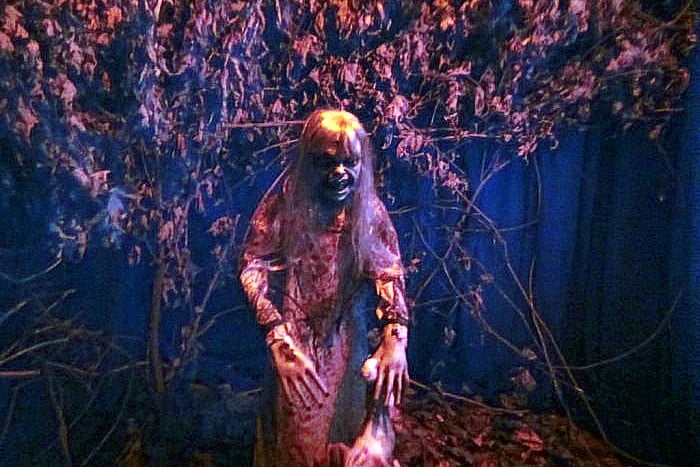
Haunts and Theaters Source Much of the Same Stuff
Another thing to be aware of about theater companies is they’re sourcing a lot of the same stuff that you are. They need makeup, you need makeup; they need costumes, you need costumes; they need paint, glue, nails, and whatever, and they may have sources that you haven’t found yet. They may have opportunities or vendors you haven’t discovered yet and vice versa. For example, their lighting designer may want some sort of tiny lighting fixture instead of the giant stage fixtures that are usually available in theaters, and they don’t know about Gantom and the little LED-light, color piano fixture. You, as a haunter, can share that resource with them. They may have really good makeup sources, whether locally in your community or ordering directly from the manufacturer. Depending on how involved you are with them, you might be able to work together to get some sort of group buy and can get a better price. You both save money. You both save money.
Many theater companies have audio that’s set up in their theater, but they rarely have the tiny speakers they might need for what I call practical audio—things like a phone ringing or a gramophone. That’s something many haunters may be able to share with them—those tiny, rinky-dink, computer speakers we’ve all used for something at one time or another. You can lend those to your theater company and maybe borrow their great Dracula cape during the haunt season.
Sponsor One Another
Another way the theater and haunt community can share is to sponsor one another. If you’re involved with a for-profit haunt and your local theater company is doing Dracula, Hunchback, or whatever, why not buy an ad in their program? That’s kind of a no-brainer. Later, see if they want to do a sponsorship for your haunt. You may that find people want to do a tit-for-tat sponsorship. Obviously, you don’t want to do that in a children’s theater program unless you have a family-friendly haunt. If your haunt is blood-soaked, you really don’t want to be advertising it in a production of Hansel and Gretel. It does have a witch, I’ll grant you that, and it does have the eating of children—hmm, maybe that’s not such a bad idea. Joint sponsorship is a great way to raise the profile of both the theater company and the haunt. When it comes to things like printing, theater companies may have ways to get things printed cheaper if they do them in bulk.
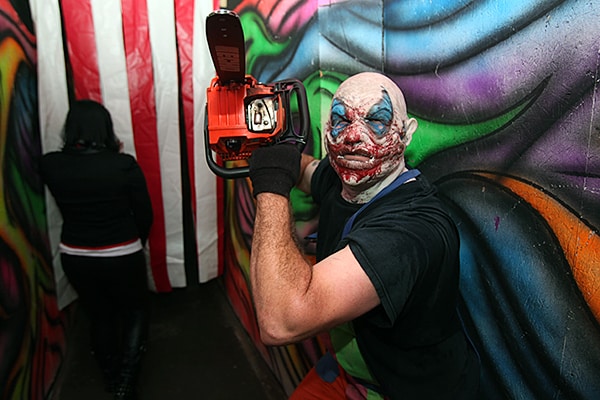
Do a Cool Fundraiser Together
As you can tell, I think there’s a lot of missed opportunity here between theaters and haunts, because there’s an overlap of those audiences. As a one more example, I offer this: Theaters are always trying to raise money, and haunts are always trying to raise money, so why not work together to do some sort of really cool fundraiser? Theaters, when they’re not producing shows, are open spaces. Most haunts are always looking for spaces to set up. Wouldn’t it be cool to have a haunted attraction and a theater come together to do a night of Edgar Allan Poe? Get some of your great queue line actors or some of the actors from the theater company to work together and present readings of The Raven or The Tell-Tale Heart or whatever, and split the revenue. It would cost very little to do. Please, please, please, let me know if you do this, because I’d love to come out and read The Raven. I don’t care where you are, I’d love to come do it. When I was working at Busch Gardens, The Raven was read in its entirety for one of the haunted houses that I wrote, because I wanted to record it. That was so much fun. You can do a fundraiser together during both of your offseasons. All it requires is the space, some actors, and a little bit of rehearsal. Another cool thing to do in theater spaces is staged seances. You could put a table on the stage, make it a high-end fundraiser, and invite the board members.
As I’ve said in many ways now, if you’re a haunt owner, make friends with your local theater company. When the tide comes in, all ships rise, and I’m all about making sure that everyone goes to is absolutely stellar.
If you’d like to ask questions, suggest topics, or even make comments on what I’ve said or written on any podcast or blog, please go to our Facebook group, go to AScottInTheDark.com or my website, or email me at [email protected]. Until next time, rest in peace.